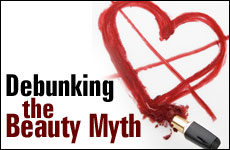 We Were the Lucky Ones
We Were the Lucky Ones


4 min read
Dealing with someone’s eating disorder made me realize that her struggle was mine as well.
This past summer I resolved to become beautiful. Sunshine heralded the end to all my exercise excuses. It was finally time to take control of my body and form it my will.
Then I met a young girl who had also designated summer as the time to become beautiful, a goal she dutifully pursued until her hands began to shake and her hair began to fall out.
I wasn’t prepared to deal with another’s eating disorder. I’ve watched the documentaries and read the literature. I’ve been trained to look for the signs, and I’ve discussed self-esteem and positive body image with teenage girls nearly as frequently as boys and dating. But entering the picture after a long, silent marathon, the problem that met me with large, solemn eyes and jutting cheekbones was far beyond me to solve.
While tending to her harmful eating habits, I found myself becoming acutely aware of what I was eating. While monitoring her preoccupation with appearance, I found myself looking in the mirror a little too frequently. Calculating a little too fastidiously if my performance that day had been up to par.
I had never completely rejected the beauty myth.
I was disturbed to discover that her struggle was mine as well. I realized that I had never completely rejected the beauty myth – the lie that altering one’s body to fit a certain, preconceived ideal is the key to happiness.
I began to pay attention to the feeling of inadequacy I had allowed trail me from summer to summer. Declining to actively battle the false pattern of thinking, I had accepted a quiet, aching self-dissatisfaction as my constant companion. I didn’t have an eating disorder, but I did detect the disordered thinking within myself that contributes to the environment that engenders eating disorders.
As long as we still buy in to the beauty myth, we can’t expect our daughters (or any young girl for whom we serve as a role model) to choose differently. We can’t teach security and satisfaction if we ourselves don’t possess it.
Our world is selling a constant lack – a lack of perfection, youth and beauty. To fight back, to finally dismantle the beauty mirage that has taken more control of our lives than we care to admit, we must choose to defy the accusation of imperfection. While we view ourselves as guilty – guilty of weighing too much, eating too much, not being beautiful enough – we are at our accuser’s mercy.
It’s time to plead beautiful. It’s time we choose to see ourselves as beautiful, and begin to believe it. It’s time we define beauty on our own terms, and not in the unrealistic, unattainable definitions that lead us on a hapless, fruitless, miserable chase.
A woman’s beauty is defined, not in terms of her looks, but in terms of her actions and her soul. “False is grace and vain is beauty/ A woman who fears God, she should be praised,” we sing every Friday night at the Shabbat table in Aishet Chayil, “Woman of Valor,” a song praising the woman of the home. As King David writes in Psalms, "all the glory of the King’s daughter comes from within” (Psalms 45:14) – not from fulfilling the media’s distorted vision of beauty.
I pledged at the beginning of this summer to become beautiful. At the beginning of this Jewish New Year, I’ve made a new pledge: to wage peace with my body, and not war.
The battle is for my own sake, and for the sake of my future family. And it’s my only way to fight for one struggling, weary young girl.
